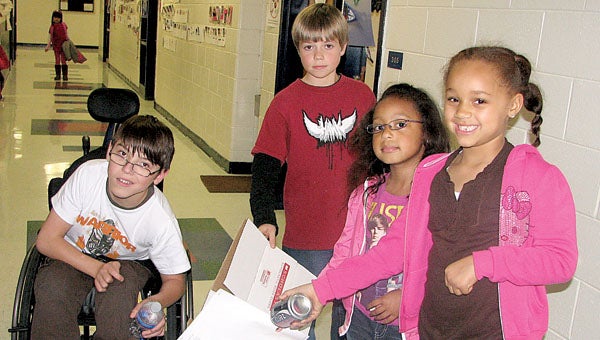Schools’ recycling suffers
Published 10:40 pm Tuesday, November 29, 2011

From left, Hunter Markley, 11; Jason Breckne, 10; Szionna Burns, 6; and Lailah Webb, 6, toss items into one of the recycling bins at Northern Shores Elementary School. Northern Shores is one of several schools in Suffolk that runs its own recycling program.
Some of Suffolk’s public schools are finding it more difficult to recycle after the city removed public recycling bins that were spread around the city.
Although the city implemented a curbside recycling program for all single-family homes in Suffolk, the city’s public schools don’t have a division-wide program. But some staff members are getting creative — or simply driving longer distances — to help their schools recycle.
Forest Glen Middle School’s recycling program was the brainchild of Spanish teacher Francisco Sanin and guidance counselor Lisa Drummond last year.
Sanin said they started a recycling club of about 55 students from all grade levels, and the students would encourage their peers to recycle during lunch.
“We were doing really well,” he said. “Every day, a group (of students) was responsible for recycling. They were doing a good job.”
To get rid of the recyclables, Sanin would load the items into his car and drop them at the large TFC Recycling bin near the school.
But when City Manager Selena Cuffee-Glenn decided to remove all the public recycling bins — except those on Market Street — earlier this year, the program came to a halt.
“Since they moved it from here, we haven’t been able to recycle,” Sanin said.
He said he can take items to the Market Street location only once a week because of the distance from the school, but he doesn’t have a vehicle that can haul that many items.
He contacted the city about getting a bin for the school but learned it would cost $120 a month, which he can’t afford.
“I’m frustrated about it,” he said, adding that his students have been disappointed the program has stopped. “They ask me about it every day.”
Reinee Goetsch, a special education preschool teacher at Northern Shores Elementary School who coordinates the recycling program at her school, said she thinks recycling at school can help the students form the same habit at home.
Goetsch said Northern Shores started recycling two years ago when Northern Shores got a grant to start a program.
The entire school was on board, she said. But the school did not win the grant again.
“I didn’t want to see recycling cut, especially after we got the kids on board,” Goetsch said.
Goetsch approached the PTA about paying for a recycling bin to be placed at the school. The group used leftover funds from a successful event to get the bin delivered to the school and pays the monthly fee for TFC Recycling to empty the bin every other week, she said.
There are small blue bins in every classroom and other parts of the school to collect recyclable items. Students help carry the items out to the big bin once a week.
Goetsch said the program has been a great success.
“We’ve had a huge response to it,” she said. “Most of the time when I go out there, the recycling bin is filled more than the trash bin.”
Like Forest Glen, John F. Kennedy Middle School also depended on the public recycling bins for its program.
But the program is still going strong, largely because of the effort assistant principal Roosevelt Brown puts into it.
“I take (the recyclables) to various places to make sure it’s where it needs to be,” he said.
Brown said he drives the paper to Butler Paper Recycling on Newport Street, the plastic bags to Farm Fresh on North Main Street, and the rest to the Market Street bins.
Sanin said he hopes another option will present itself, so Forest Glen’s recycling program can continue. Until then, he said, it can’t move forward.
“The only thing I’m asking the city to do is provide each school with a bin and have someone pick the stuff up, free of charge,” he said.
Sanin said he would love to see all of the schools get recycling bins, because so much school trash can be recycled.
“Putting recycling in schools is the best idea,” he said. “You’re helping the environment, helping the school and helping the city.”






